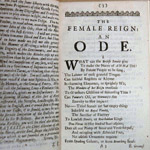 |
During 1688 to 1815, the period known as the long eighteenth century, the British people were at war almost continuously. There was the Nine Years' War (1689-97), the War of the Spanish Succession (1702-13), the War of the Quadruple Alliance (1718-20), the War of Jenkins's Ear (1739-48), the War of the Austrian Succession (1740-8), the Seven Years' War (1756-63), the War of Independence (1775-83), the war with Revolutionary France (1793-1802), and the Napoleonic Wars (1803-1815). Successful battles such as Blenheim (1704) under the leadership of the Duke of Marlborough reflected well on the reign of Anne, Queen of England, Ireland and Scotland from 1702 to 1714. Laudatory war poems often puffed up morale. In his much-printed jingoistic poem The Female Reign, Samuel Cobb (1675-1713) called her 'O Anna, British heroine!' She was married to Prince George of Denmark. |

